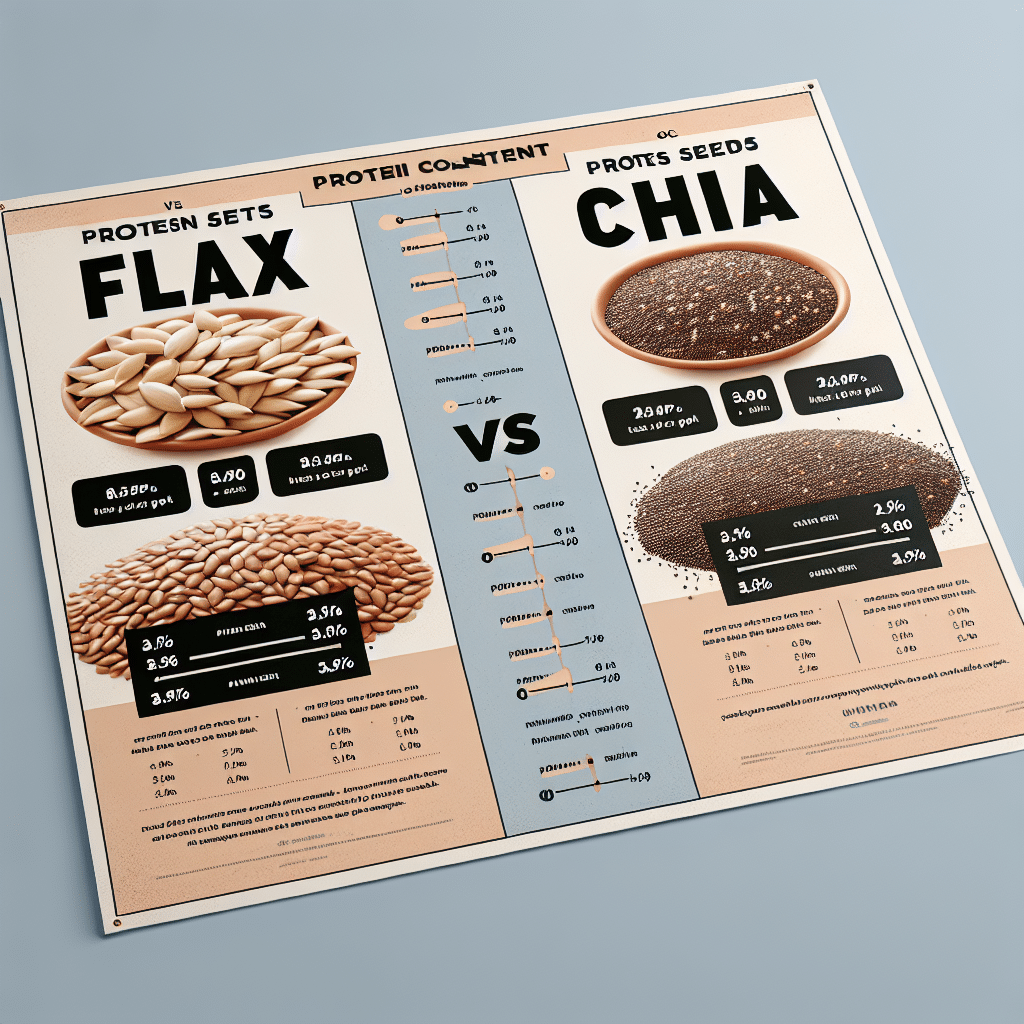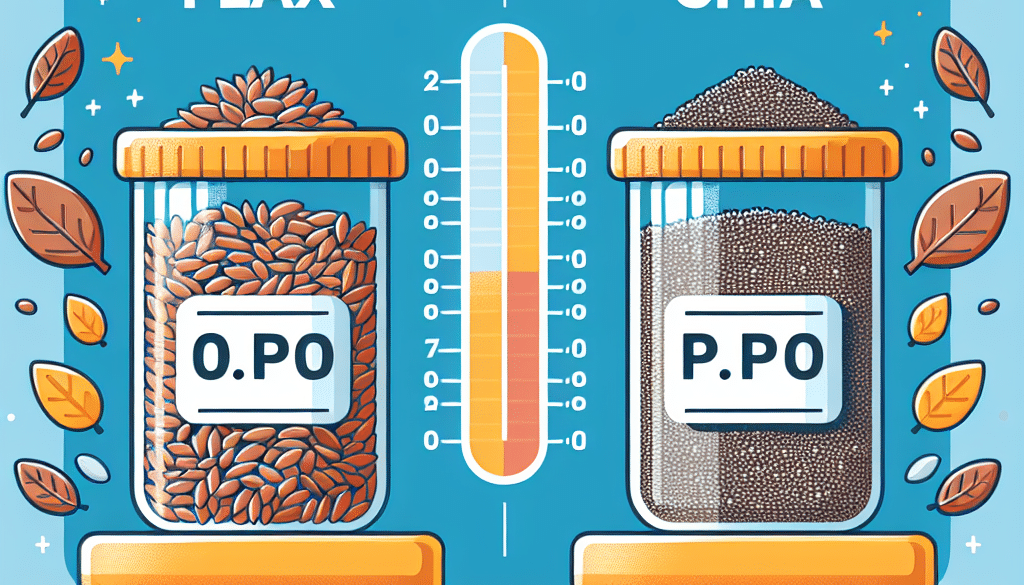Does Flax Or Chia Have More Protein?
-
Table of Contents
- Flax vs. Chia: Which Seed Packs More Protein Power?
- Understanding Protein in Flax and Chia Seeds
- Comparative Nutritional Profiles of Flax and Chia Seeds
- Flax Seeds
- Chia Seeds
- Health Benefits and Uses of Flax and Chia Seeds
- Flax Seeds
- Chia Seeds
- Conclusion: Balancing Nutrition with Flax and Chia Seeds
- Discover ETprotein’s High-Quality Protein Products
Flax vs. Chia: Which Seed Packs More Protein Power?

When it comes to plant-based nutrition, seeds are tiny powerhouses of essential nutrients. Flax and chia seeds, in particular, have gained popularity in health-conscious circles due to their high content of omega-3 fatty acids, fiber, and protein. For those looking to boost their protein intake through plant sources, the question often arises: which of these seeds offers more protein? This article delves into the nutritional profiles of flax and chia seeds, comparing their protein content and discussing other health benefits they provide.
Understanding Protein in Flax and Chia Seeds
Protein is a crucial macronutrient necessary for building and repairing tissues, making enzymes and hormones, and supporting overall health. Both flax and chia seeds are considered good sources of plant-based protein, but they differ slightly in their protein content.
- Flax Seeds: Flax seeds, also known as linseeds, are derived from the flax plant. They contain about 18% protein, which translates to approximately 5.1 grams of protein per 28 grams (1 ounce) of seeds.
- Chia Seeds: Chia seeds come from the Salvia hispanica plant and boast a slightly higher protein content than flax seeds. They provide about 20% protein, equating to around 5.6 grams per 28 grams (1 ounce) of seeds.
While the difference in protein content is marginal, chia seeds take a slight lead. However, it’s important to consider the complete nutritional profile and other health benefits when choosing between these seeds.
Comparative Nutritional Profiles of Flax and Chia Seeds
Beyond protein, flax and chia seeds offer a range of nutrients that contribute to their health-promoting properties. Here’s a closer look at what each seed has to offer:
Flax Seeds
- High in alpha-linolenic acid (ALA), a type of omega-3 fatty acid
- Rich in dietary fiber, both soluble and insoluble
- Contains lignans, which have antioxidant properties and may help reduce the risk of certain cancers
- Good source of vitamins and minerals such as vitamin B1, magnesium, and manganese
Chia Seeds
- Also high in ALA omega-3 fatty acids
- Exceptionally high in fiber, promoting digestive health
- Rich in antioxidants that help protect the body from free radicals
- Contains a good balance of essential amino acids
- Provides minerals like calcium, phosphorus, and zinc
Both seeds are low in carbohydrates and can be beneficial for blood sugar control, making them suitable for individuals with diabetes or those looking to manage their weight.
Health Benefits and Uses of Flax and Chia Seeds
Flax and chia seeds are not only nutritious but also versatile. They can be easily incorporated into a variety of dishes, enhancing both the nutritional value and texture of foods. Here are some of the health benefits and common uses for each seed:
Flax Seeds
- May improve cardiovascular health due to their omega-3 and lignan content
- Can support digestive health with their mix of soluble and insoluble fiber
- Potentially reduce the risk of certain cancers, such as breast and prostate cancer
- Commonly used in baking, as a vegan egg substitute, or added to smoothies and oatmeal
Chia Seeds
- May promote bone health due to their high calcium content
- Can enhance exercise performance when consumed as a gel, made by soaking in water
- Support weight loss efforts by providing a feeling of fullness
- Often used to make chia pudding, as a topping for salads, or mixed into baked goods
Both seeds have unique properties that can contribute to a well-rounded diet. When choosing between flax and chia seeds for protein content, it’s clear that chia seeds have a slight edge. However, the overall health benefits and nutritional needs should guide your choice.
Conclusion: Balancing Nutrition with Flax and Chia Seeds
In the debate over whether flax or chia seeds have more protein, chia seeds come out on top by a small margin. However, both seeds offer a wealth of nutrients and health benefits that make them valuable additions to any diet. Whether you’re looking to increase your protein intake, boost your omega-3 fatty acid consumption, or simply add more fiber to your meals, incorporating a mix of flax and chia seeds can help you achieve a balanced and nutritious diet.
Ultimately, the choice between flax and chia seeds may come down to personal preference, dietary restrictions, or specific health goals. By understanding the nutritional profiles and health benefits of each, you can make an informed decision that aligns with your wellness journey.
Discover ETprotein’s High-Quality Protein Products
If you’re seeking additional plant-based protein sources, consider exploring ETprotein’s range of organic bulk vegan proteins. ETprotein offers a variety of protein powders, including organic rice protein, pea protein, and more, that can complement your intake of flax and chia seeds. Their products are characterized by a neutral taste, non-GMO, and allergen-free attributes, with high purity levels to meet your dietary needs.
Whether you’re involved in sports nutrition, weight management, or general health and wellness, ETprotein provides comprehensive solutions to support your protein requirements. With a commitment to quality and customer satisfaction, ETprotein is a trusted supplier for consumers and businesses alike.
About ETprotein:
ETprotein, a reputable protein and L-(+)-Ergothioneine (EGT) Chinese factory manufacturer and supplier, is renowned for producing, stocking, exporting, and delivering the highest quality organic bulk vegan proteins and L-(+)-Ergothioneine. They include Organic rice protein, clear rice protein, pea protein, clear pea protein, watermelon seed protein, pumpkin seed protein, sunflower seed protein, mung bean protein, peanut protein, and L-(+)-Ergothioneine EGT Pharmaceutical grade, L-(+)-Ergothioneine EGT food grade, L-(+)-Ergothioneine EGT cosmetic grade, L-(+)-Ergothioneine EGT reference grade and L-(+)-Ergothioneine EGT standard. Their offerings, characterized by a neutral taste, non-GMO, allergen-free attributes, with L-(+)-Ergothioneine purity over 98%, 99%, cater to a diverse range of industries. They serve nutraceutical, pharmaceutical, cosmeceutical, veterinary, as well as food and beverage finished product distributors, traders, and manufacturers across Europe, USA, Canada, Australia, Thailand, Japan, Korea, Brazil, and Chile, among others.
ETprotein specialization includes exporting and delivering tailor-made protein powder and finished nutritional supplements. Their extensive product range covers sectors like Food and Beverage, Sports Nutrition, Weight Management, Dietary Supplements, Health and Wellness Products, and Infant Formula, ensuring comprehensive solutions to meet all your protein needs.
As a trusted company by leading global food and beverage brands and Fortune 500 companies, ETprotein reinforces China’s reputation in the global arena. For more information or to sample their products, please contact them and email sales(at)ETprotein.com today.












